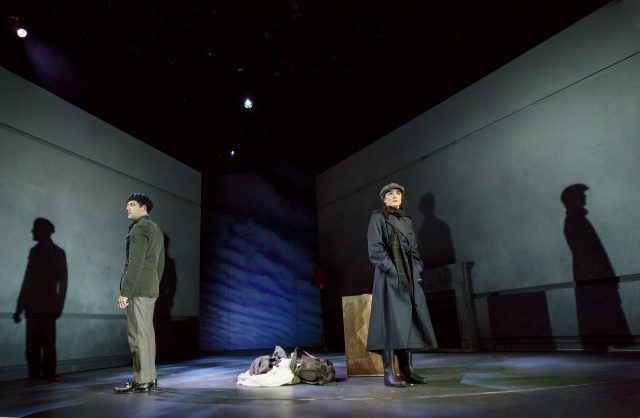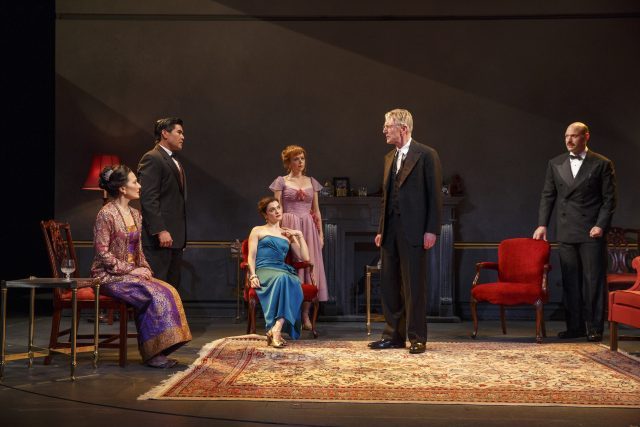
Codename Lazar (Ken Barnett) and Susan Traherne (Rachel Weisz) unexpectedly meet at a WWII drop site in Public Theater revival of PLENTY (photo by Joan Marcus)
The Newman Theater at the Public Theater
425 Lafayette St. by Astor Pl.
Tuesday – Sunday through December 1, $90-$95
212-967-7555
www.publictheater.org
“I don’t know why anybody lives in this country,” Alice Park (Emily Bergl) tells her best friend, Susan Traherne (Rachel Weisz), at the beginning of David Hare’s Plenty, which explores the failed promise of plenty in post-WWII England. The show is being revived at the Public, where it made its U.S. debut in 1982, directed by Hare, and later moved to Broadway, where it earned four Tony nominations, including Best Play. This first major New York City revival is a compelling if not wholly successful production that travels back and forth in time, shuffling between 1943 and 1962 in nonlinear fashion. The story centers on Susan, a strong woman who speaks her mind, even as she starts losing control of it. She goes from being a secret courier in France during the war to a diplomat’s wife to a feminist who refuses to rely on a man to make her happy. “I’d like to change everything but I don’t know how,” she tells Alice. Susan meets a series of men she carefully manipulates, from her caring dullard of a husband, Raymond Brock (a finely mustachioed Corey Stoll), who works for old-fashioned ambassador Leonard Darwin (the always excellent Byron Cummings), and Mick (LeRoy McClain), a potential baby daddy, to Sir Andrew Charleson (Paul Niebanck), head of the Foreign Office, and Codename Lazar (Ken Barnett), an English paratrooper. Susan declares exactly what she’s thinking, not worried about who she might offend or how it will affect her marriage or reputation. But true happiness is just out of reach, a parable of England’s efforts to resurrect itself after the war. “This is hell,” Susan says. “No doubt,” Alice agrees, a far cry from the “peace and plenty” they, and all of England, were expecting.

The English argue over their future in return of David Hare’s PLENTY to Public Theater (photo by Joan Marcus)
Hare is undergoing quite a resurgence recently, with major revivals of Skylight on Broadway and The Judas Kiss at BAM (and around the world) and his latest film, Denial, which he wrote for director Mick Jackson, now in theaters, also starring Weisz. In Plenty, Weisz, in the role originated by Kate Nelligan and later played on film by Meryl Streep in 1985 and onstage in London by Cate Blanchett in 1999, is superb as Susan, bringing a wide range of emotions to a character whose fears are getting the best of her even as she fights for her personal freedom. (The film also starred Tracey Ullman as Alice, Charles Dance as Brock, John Gielgud as Darwin, Sting as Mick, Ian McKellen as Charleson, and Sam Neill as Lazar; the original Public Theater production featured Nelligan, Edward Herrmann, Kelsey Grammer, and Dominic Chianese.) Some of the scenes fall flat, feeling out-of-date, particularly when Susan, Brock, and the aptly named Darwin meet with the Burmese ambassador (Pun Bandhu) and his wife (Ann Sanders) and briefly discuss the Suez Canal crisis, which has little impact on contemporary American audiences. Mike Britton’s set features a large horizontal wall that rotates to change scenes, with interstitial jazz by David Van Tieghem as the story goes from Susan and Brock’s house to Darwin’s office to a WWII drop site. Five-time Tony-nominated director David Leveaux (Nine, Anna Christie) never quite reaches a steady narrative flow, as the jumps in time can be confusing. In addition, many of the British references get lost as the disillusioned Susan represents the highs and the lows, the promise and the failure experienced by the country over the course of thirty years. “Oh yes. New Europe. Yes yes,” Darwin says to Brock and Susan early on. “Reconstruction. Massive. Massive work of reconstruction. Jobs. Ideals. Marvellous. Marvellous time to be alive in Europe. No end of it. Roads to be built. People to be educated. Land to be tilled. Lots to get on with. . . . Have another gin.” Or as Brock puts it, “Of course our people are dull, they’re stuffy, they’re death. But what other world do I have?” It’s a world that Susan won’t accept, and it destroys her as well as nearly all those around her.